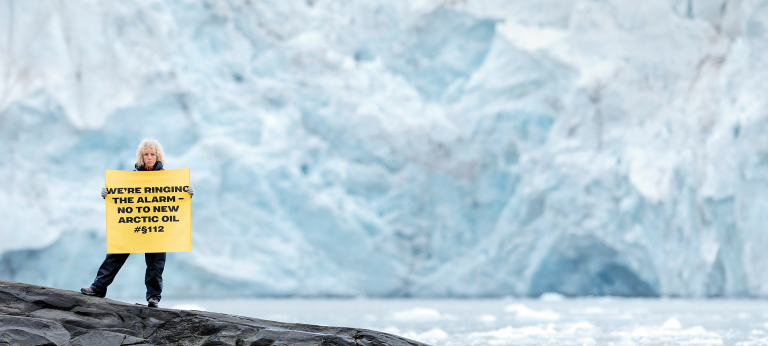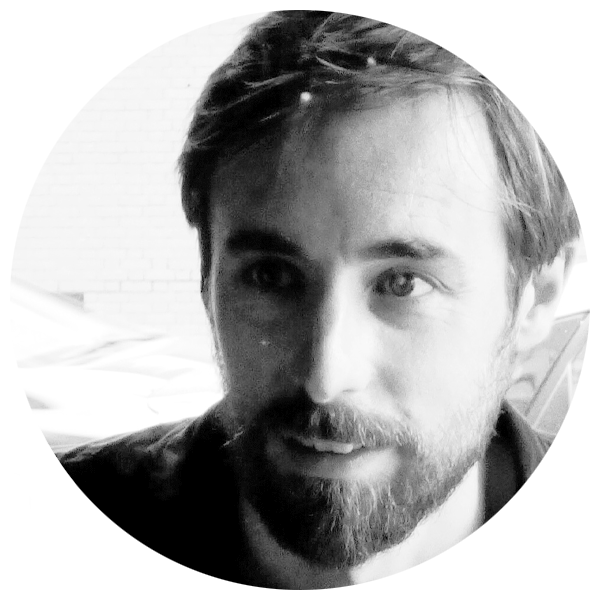How robust is your company?
![{[downloads[language].preview]}](https://www.rolandberger.com/publications/publication_image/TA31_Cover_EN_download_preview.jpg)
Think:Act Magazine explores how today’s companies can become robust and survive the coming decade through lessons in innovation, purpose and adaptation.


Jennifer Morgan, pictured above at a glacier in Svalbard shortly after joining Greenpeace International in 2016, is raising awareness of the impact of Arctic oil drilling.
She is the executive director of the best-known pressure group in the world at perhaps the most challenging point in its history. Jennifer Morgan takes some time out to talk about leadership, pressure and responsibility from her post at the helm of Greenpeace.
1.5°C is the degree of atmospheric warming above pre-industrial levels we will see by 2040 if greenhouse emissions continue at the current rate, according to a 2018 UN/IPCC study.
Jennifer Morgan is worried. As we enter what some are calling the "decisive decade" for climate change, the executive director of Greenpeace International is concerned about a lack of government leadership. To make matters worse, she says, many companies are yet to fully understand the business risks it poses. After serving as the joint head of Greenpeace International for three years, Morgan is now the sole leader of the world’s most renowned environmental NGO, which comprises 4,000 employees and 15,000 volunteers around the globe. In this interview, conducted shortly after she attended the January 2020 World Economic Forum in Davos, she discusses how Greenpeace combines expert knowledge and activism to make its mark, the danger of stranded assets and why we should remain optimistic about the future.
I found that co-leadership can make an organization smarter. Having another person on the same level to discuss decisions with can make those decisions stronger. You’ve thought things through together. Especially when you have two different skill sets, as Bunny [McDiarmid] and I did. It also sets a good example: If the executives are sharing leadership and sharing power, it sends a signal about the value of shared leadership across the entire organization. We're always trying to enable decisions to be made throughout the organization, as close to the ground as possible. I think shared leadership can help you do that.
$54 trillion is the estimated mean net present value of the costs from warming in 2100, based on the UN/IPCC figures.
One of the key lessons I learned was really recognizing the difference between leadership and management. I think a lot of leadership comes from instinct, from your own personal experiences. When you have someone else sitting next to you, in the same position, it makes it more challenging. I certainly learned a lot about the difference between management and leadership. And you really have to check your ego at the door. It has to be about the mission of the organization and not about who has more visibility here or there. I think that’s a key lesson that we learned over time.
This was my fourth time.
People are certainly paying more attention to it. There's more airtime for environmental issues. But a lot of it's just talk. I don’t see much real action coming out of it. And words alone aren’t going to get us there.
I think there is a fair amount of respect. We are a serious organization that works with millions of people around the world. And we have activists that are out there peacefully demonstrating, so I think we're not that easy to just flick off. We released a report during Davos called It’s the Finance Sector, Stupid, which looks at the links between finance and the fossil fuel industry. From the conversations I had with some of the CEOs, they were a bit annoyed with Greenpeace, that we were putting our finger on something. But I think that's just fine. We must have struck a nerve.
Formerly the global director of the climate program at the World Resources Institute, global climate change director at Third Generation Environmentalism and leader of the Global Climate Change Program at the WWF, Jennifer Morgan became co-executive director of Greenpeace International in 2016 and has led the NGO on her own since 2019.
Greenpeace is many things, including incredible in-house experts across a range of sectors. If you know the facts, if you understand how the system you're trying to change works, then it’s harder to be dismissed. Because we understand exactly how things work, we understand what needs to change. I think that combination of knowledge and activism is pretty formidable when it comes together
When people understand what's at stake, they will be willing to change because they see what's on the line.
Yes. People are realizing we were right. [We] put out energy revolution scenarios years ago and we were told it was crazy how much renewable energy we said needed to come into the system. But actually, even we underestimated it slightly.
There have been instances where Greenpeace has run campaigns on fisheries or deforestation, and companies have then sat down, negotiated with us and changed their practices. In most places, though, our role is less about negotiating the details of legislation and more about creating the political and social conditions for laws to be as ambitious as possible.
The climate emergency is a fundamental focus because of the time frame. Science has clearly said: "This is the decisive decade." I think it's essential that everyone in and outside the financial sector understands that it is funding the extraction of fossil fuels around the world. A key priority is to have banks phase out their funding of fossil fuels and shift their investments into things like renewable energies and sustainable agricultural practices. The risk of stranded assets [equipment or resources reduced in value due to an external change, such as technology or social habits] is quite real. So, we're very focused on making it clear that the fossil fuel industry really is incredibly toxic for our health, for our climate, for our political systems.
No, I don't. We've seen the effects of flooding and fires recently, what that can do to supply chains, but I don’t really see companies changing what they're doing. If you're an insurance company, or a bank, or you're in the fossil fuel industry, you need to really understand that it can't keep going the way that it's going. You need to start to have a managed transition of your company – from making internal combustion engine cars to electric vehicles and being more of a mobility company, for example, or being more of an energy company than an oil company. I see very few businesses showing that they've clearly understood those risks.
You can see bits of progress here and there, but on the large corporate side, no, I'm not that optimistic. I'm much more optimistic about small and medium-sized companies around the world who see the opportunity that is there. I think Europe's Green Deal, which aims to shift the EU to zero net carbon emissions by 2050, is going to be interesting. The incentives to contribute positively, rather than just paying the penalties of continuing on a business-as-usual track, will encourage innovation.
90% is the amount by which the use of coal as an electricity source would have to drop by 2050 to limit warming to 1.5°C by 2100.
I don't see very much government leadership at all right now. The Green Deal in Europe is not as bold and ambitious as we would like. As developed countries with resources to go further and faster, we think the EU should be aiming for a 65% reduction rather than a 55% reduction by 2030. We need these countries to take the lead, to give more space for developing countries to take a bit longer. But I think the scope of it, and the transition that's included, is a step in the right direction and that's very important. In general, though, governments are shortsighted. It's not like governments are really pushing it to corporates. In fact, big business has a huge influence on laws and regulations ... and companies are mostly interested in short-term profit. We live in a system that has very strong vested interests, so it really requires governments to step above that, to look across the whole series of risks that are there and put smart policies in place.
I'd get fossil fuel money out of politics.
[Laughs] Well, it’s different in different countries but if people really understood how much influence these companies have in policies, they would be pretty upset. You've got massive deforestation in Brazil, coal companies involved in corruption in Indonesia. I think it would make a difference.
$372 billion is the annual amount spent around the world on government subsidies for fossil fuels according to a 2019 IISD report, more than three times what is spent on renewable projects.
I think so. I mean, who out of the next generation will even want to work for a fossil fuel company? How socially acceptable is it to act like that? We're just on the cusp of getting younger people into leadership positions now, people from a generation that doesn't just understand it, but is actually quite scared of what their future looks like. But I really hope we don't have to wait for a whole generational change of leadership, because we just don't have time. I hope that the current leadership can hear the voices of youth.
Oh! I think we should be … No, I think we have to be optimistic. But I think how optimistic we are will depend on how much we engage in the next couple of years. I'm optimistic because I believe in the integrity of the human spirit. When people understand what's at stake, they will be willing to change because they see what's on the line, if not for themselves and their neighbors, then at least for their children. Watching what's happened in the last year, that makes me optimistic, but if people don't start engaging, if governments and corporations don't start taking that responsibility, then my optimism wanes.
![{[downloads[language].preview]}](https://www.rolandberger.com/publications/publication_image/TA31_Cover_EN_download_preview.jpg)
Think:Act Magazine explores how today’s companies can become robust and survive the coming decade through lessons in innovation, purpose and adaptation.


